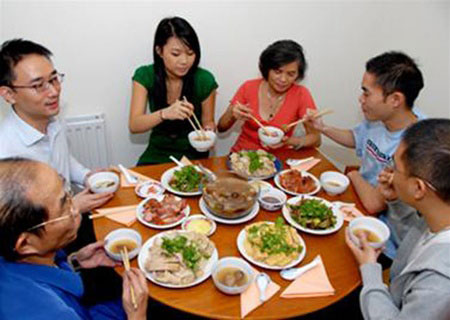During my 10 months in Viet Nam, I was invited a few times by Vietnamese friends to eat with their families. Every time was a new discovery. Meals in Viet Nam are often very subtle and really different from France. Here is what I learned from my experiences:
 |
| Manners: Vietnamese families eat around a table or sitting on a mat. As in any eating culture, table manners are very important. — VNA/File Photo |
If you look at all the world’s cultures, they all have some kind of eating ritual. So when you are invited to eat a meal in Viet Nam, look for the unique local traditions.
As in many countries, it is not advisable to come to someone’s house empty-handed. The most popular offering is, in my experience, fruit. Dragon fruit, mangoes and other expensive fruit are especially prized. Don’t be surprised if the host does not unpack the fruit right away – he or she will keep it and instead offer you other fruit. It’s also to your advantage to bring a specialty from your country or even a bottle of wine.
Chopsticks and rice
Every Vietnamese meal follows some basic principles. Rice is a staple, consumed at basically every meal, and it will typically be placed at the end of the table.
Traditionally, the housewife serves the family members. But that pattern is starting to disappear. After rice, the second basic ingredient is vegetables and fruit, followed by meat and seafood, which during previous hard times were quite rare. Today, the standard of living is much higher, so meat takes a more important place.
Another element essential to the Vietnamese table: chopsticks. Eat with the thinner end. When you are not actively eating, take care always to prop them across your bowl.
To plant them vertically is a sign of misfortune and death because it resembles the incense sticks used for the dead. Younger generations are more flexible with these rules, while in the most traditional families the practice remains firmly taboo. Finally, it is common for the host to serve his guest. Observe that he does not pass food from chopstick to chopstick but instead places it in your bowl.
Dinner is ready!
The expression “dinner is ready!” resonates naturally to the ears of Westerners, but Vietnamese turn away from this trite formula.
You might sit around a table or on a mat on the floor. If the latter, sit cross-legged and do not extend the legs. The feet should not point towards food, as this is unhygienic.
The dishes are all placed together between the guests. According to a Vietnamese proverb, “an trong noi ngoi trong huong” (we must look at the bottom of the pan before taking). As in France, you should never take the last piece, unless the host prompts you. Do not fill your bowl to the brim. Take a small quantity each time. Never put a piece of food from the serving plate directly in your mouth. Instead, place it in your bowl first, where it will mix with other food and taste even better.
Last comes dessert. Forget about cake. Vietnamese people instead offer fruits, rarely the ones you brought. As mentioned above, the custom is to keep these gifts for later. Other fruits are often given to the guest to take away.
There are many more customs I have not mentioned here. The secret is to observe and adapt. Don’t worry, missteps will be easily forgiven if you are a foreigner.
by Eloise Levesque
Eating and etiquette: Top tips for joining a VN family meal
No comments:
Post a Comment